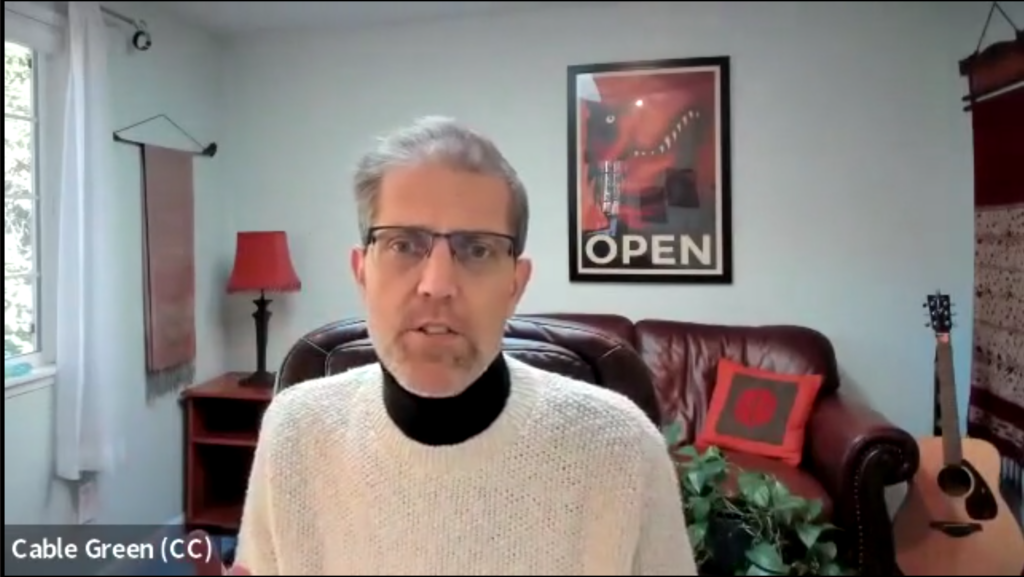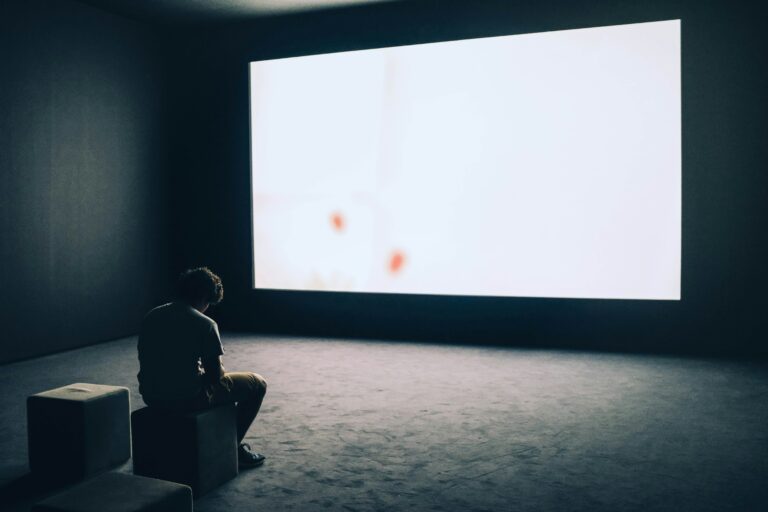Reflection – Guest Lecture With Cable Green
This week I am reflecting on the guest lecture with Cable Green, an informative lecture on intellectual property and open licensing.

Green, who works with Creative Commons, believes in the promotion of open knowledge of big social issues such as climate change or Covid-19. At Creative Commons they promote not only theoretical collaboration but operate with the foundation that to solve big problems the knowledge about these problems has to be open. For example, Green mentions that educational resources about climate change need to be open and easily accessible to encourage a culture of shared collaboration. In terms of climate change, this could look like learning about what contributes to large carbon footprints, ways to minimize our impact, and then teaching others how to change their behaviours. Green mentions:
We need to have open science. All of the research about climate change should be freely available to all anybody around the planet that wants to read it. Because if you don’t know about carbon capture technology, then you’re probably not going to try to enact it if you don’t know… [If] you want to solve any problem, the knowledge about it, the educational resources, the science, the data, even the culture around it need to be open.
(GREEN, 2025)
What Green mentions is incredibly tied to what I examine daily as a sociology student: who benefits from social norms that we have agreed on in society? These problems such as climate change, COVID-19, the overdose crisis, and structural inequalities are all human-caused problems which require collaboration, not privatization. This makes me reflect on how films, a powerful tool that can share a more vulnerable and nuanced aspect of the lives of people, can be a powerful way of sharing knowledge and experiences.
An example of this is the documentary American Movie directed by Chris Smith.
American Movie is a documentary that dives deep into the complex issues surrounding socio-economic class. It is a documentary that examines how class and the structural elements that come with it, impact individuals like Mark Borchardt and his close friends. Through an intimate exploration, American Movie paints a vivid picture that displays how Mark and his friends are perceived as distinct from mainstream society physically and metaphorically. This is a film that showcases their journey as individuals who have formed a tight bond with each other and share a common vision amidst persistent negativity and societal alienation. Mark has a vision in his life to become a filmmaker, but his low socioeconomic status and financial security prove to be getting in the way. The documentary highlights the struggles that are faced in having your experiences understood by those outside your immediate circle. There will always be an inherent power struggle and internalized hierarchical stance among people in society. This notion is observed when Mark’s brother, a man who has managed to leave home and make a “name” for himself as a businessman, makes degrading comments surrounding his disapproval of Mark’s life choices to remain stagnant. Despite all this, American Movie showcases how marginalized individuals find strength in unity and community that stands separate from societal norms and prejudices.
The documentary shares the story of Mark who is dedicated to making a feature film. Mark’s dedication and sheer commitment to his dream despite the plethora of structural obstacles are a testament to his resilience. This resilience is something that many marginalized individuals have had to harbour. From financial constraints to even getting in the way of himself, American Movie displays how challenges that are often perceived as a weakness from the dominant culture, can serve to be integral or a factor pushing toward creative fulfillment. The documentary is compelling because it dives into an intimate view of financial instability. The film challenges the viewer with any biases we have. Instead of the typical “helpless” individuals facing poverty trope, this documentary challenges our bias and displays that despite our perceived assumptions, Mark and his friends have been able to find solace in supporting one another.
American Movie is a documentary that underscores the inherent difficulty in understanding the perspectives and aspirations of individuals from different socioeconomic backgrounds unless you have been in that very position. There is a tendency toward egotistic comparisons surrounding success and what high achievement in life is; society has internalized privilege. Dismissive attitudes and remarks are small ways in which dominant ideas of success such as becoming a lawyer or doctor are further encouraged. The documentary serves as a reminder or a warning against hierarchical notions of success and how that directly correlates to our tendency to deem certain people as living a “worthy” enough life. Questions arise surrounding the subjective nature of achievement, and how for so long and for many marginalized individuals there has been an internal and external struggle of self-locating in a vast world that seems to be in complete opposition to your aspirations and sheer existence. Ultimately American Movie is a documentary that challenges the notion of the helpless marginalized individuals who need to rely on the assistance of the dominant group to feel worthy or seen. American Movie directly refutes that and highlights that individuals just like Mark can defy societal expectations and create something profound without feeling as though they have to abide by the standards or practices or conditions that are expected of them; they too can create something profound and meaningful.
Research shows that individuals who are experiencing poverty identify social or community agencies such as rooming houses, health centres, and drop-in centers as spaces where they belong (Stewart et al., 2009). It is in these pockets of human gathering that they have been able to find a sense of belonging and emotional support (Stewart et al., 2009). This is to say that those who are experiencing poverty are very much still members of society. We have an insidious tendency to disregard members of society whom we do not see daily. Part of this issue is due to our socialization, but the other part of it, I believe, has to do with the lack of representation on screen. Cinema and film at its core are not discriminatory and encourage what Green mentions about open knowledge. As an art form, anyone’s stories should be able to be represented on screen; everyone has stories and experiences to share. The sad reality is that as humans, due to our own biases, we get to decide whose story is “worthwhile” or whose story is “captivating” enough to be marketable. This is why I admire American Movie. It is a documentary that is a direct rejection of the status quo in the film industry: here is the reality of a group of people who are silenced. American Movie is compelling because it showcases that marginalized groups are not silent, but rather they are silenced by the hegemonic forces of society that pick and choose who gets to have moments of exposure.
References
Stewart, M. J., Makwarimba, E., Reutter, L. I., Veenstra, G., Raphael, D., & Love, R. (2009). Poverty, sense of belonging and experiences of social isolation. Journal of Poverty, 13(2), 173-195.
TheDocumentaryBlog. (2009, April 15). American Movie Official Trailer – HD. YouTube. https://www.youtube.com/watch?v=zMFZOu8rDUQ







This is an amazing reflection! Love your in-depth analyzation on the topic and I can see your love for American Movie shown through the second half the reflection.